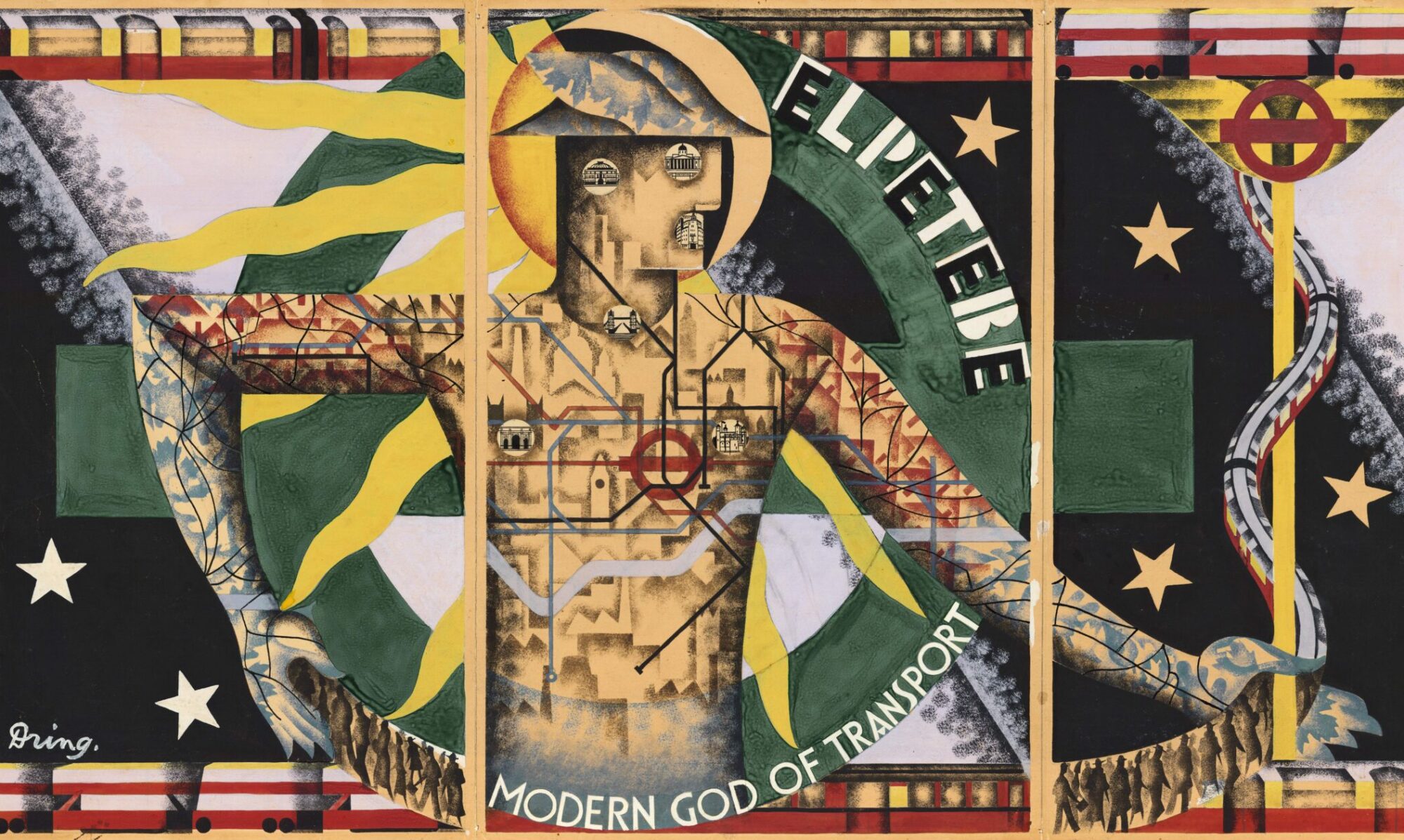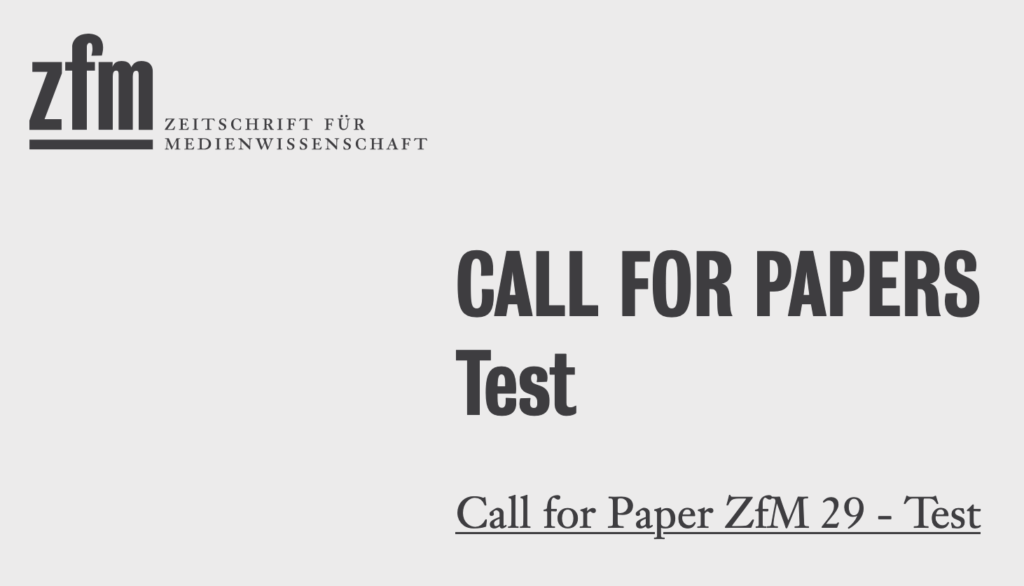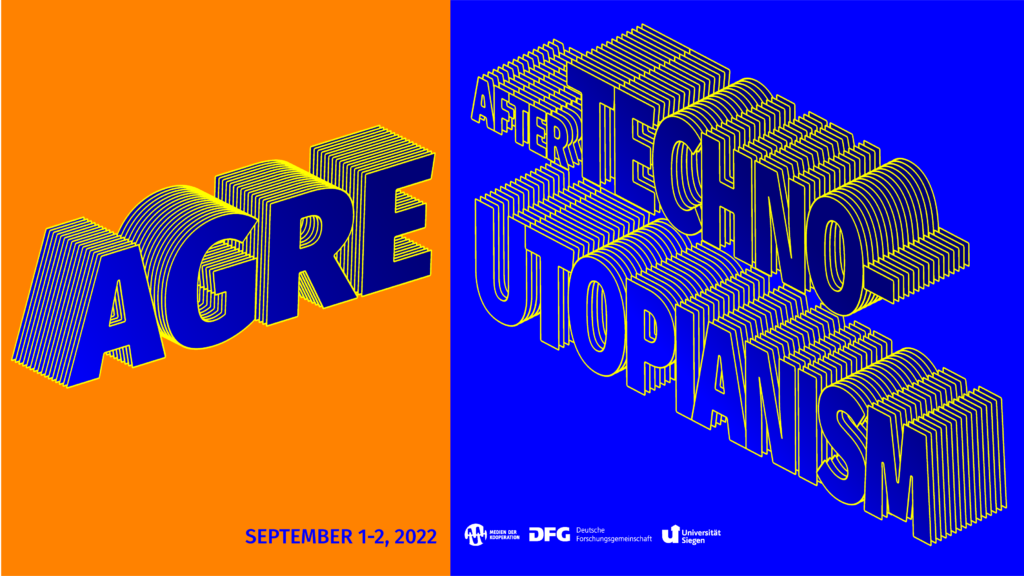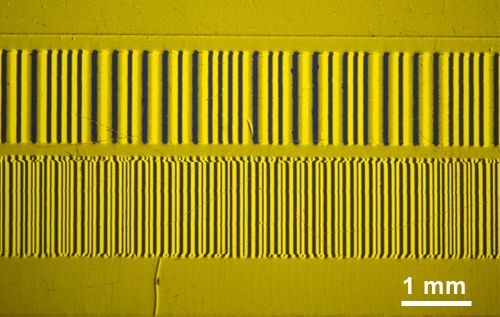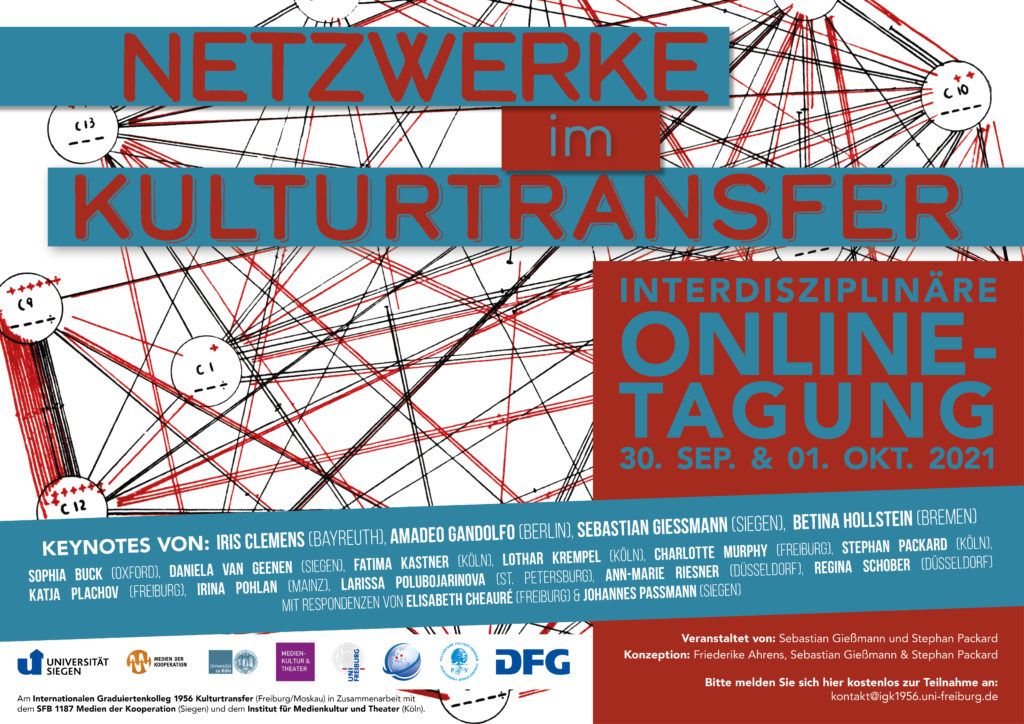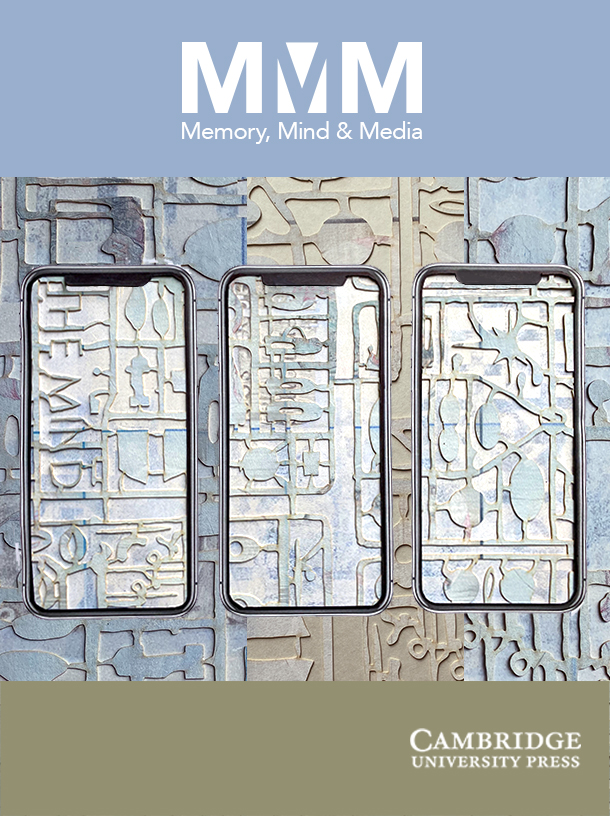 ‘Digital Twins’ are currently the most important drivers of the fourth industrial revolution. The technical products and processes that are becoming ever more complex are now developed and tested in the virtual sphere before they emerge in the ‘real’ world. Future artifacts and practices are first produced as software models and simulated as so-called digital twins. The paradigm of digital media technologies is therefore subject to fundamental change through the prevalence of digital twins in industry and research: the digital is no longer a real-time virtual representation of a real-world physical object: it is exactly the opposite and concurrently much more than that, allowing the analysis of future performances of objects without the physical presence of the objects. Digital twinning therefore promises not only the potential of making futures predictable through recognition and correlation of virtual and physical (Chun 2021), but the ability to do so without physical counterparts. „Digital Twins and Doubles: Data of Cooperation [call for contribution]“ weiterlesen
‘Digital Twins’ are currently the most important drivers of the fourth industrial revolution. The technical products and processes that are becoming ever more complex are now developed and tested in the virtual sphere before they emerge in the ‘real’ world. Future artifacts and practices are first produced as software models and simulated as so-called digital twins. The paradigm of digital media technologies is therefore subject to fundamental change through the prevalence of digital twins in industry and research: the digital is no longer a real-time virtual representation of a real-world physical object: it is exactly the opposite and concurrently much more than that, allowing the analysis of future performances of objects without the physical presence of the objects. Digital twinning therefore promises not only the potential of making futures predictable through recognition and correlation of virtual and physical (Chun 2021), but the ability to do so without physical counterparts. „Digital Twins and Doubles: Data of Cooperation [call for contribution]“ weiterlesen
Aesthetics of Boundary Objects
Test – Zeitschrift für Medienwissenschaft 29
Bereits vor Ausbruch der Covid19-Pandemie haben David Stark und Noortje Marres die fortwährende Ausweitung von Testverfahren als eine Signatur von test societies beschrieben. Sie konzentrierten sich dabei auf das wechselseitige Verhältnis von Test und Gesellschaft(en). Denn Tests finden nicht allein nur in Labor und Werkstatt, Büro oder Studio statt, sondern in sämtlichen Lebens- und Arbeitsbereichen. Doch in welchem Verhältnis stehen Medien und Tests – historisch, in der digitalen Gegenwart, politisch und methodologisch?
Wir schlagen vor, Tests als offene Situationen zu verstehen, in denen mittels etablierter oder sich erst während des Testens etablierender Maßstäbe soziotechnisch Entscheidungen ermöglicht werden. Mit Tests wird das Neue und Unerwartbare nicht nur erkundet, sondern medial registriert, identifiziert und klassifiziert. Auf diese Art und Weise werden situierte Daten als Fakten generiert, die wiederum Entscheidungen ermöglichen. Dadurch transformiert der Test das Getestete und seine Umgebung. Für einen medienkulturwissenschaftlichen Begriff des Tests gilt: In den Mikroentscheidungen des verteilten und verteilenden Testens steht das Soziale selbst auf der Probe. Der annoncierte Themenschwerpunkt von Heft 29 untersucht deshalb medienhistorische wie gegenwärtige Praktiken und Techniken von Testgesellschaften und fragt, wie sich Medien und Tests wechselseitig konstituieren – ob als Sinnestest, Testbild oder Testton, Probedruck, Testvorführung, Pilotfilm, Betaversion, Test technischer Objekte und Abläufe, forensische Analyse, Wissensprüfung oder biomedizinische Zertifizierung.
Besondere Aufmerksamkeit sollen die Politiken des Testens erfahren. Testgesellschaften können kontrollgesellschaftliche Elemente enthalten, doch die Politiken von Testsituationen entfalten sich auf unterschiedliche Weisen. Anstelle direkter Überwachung dominiert das permanente monitoring. Neben der Frage, wie mit Tests Entscheidungen getroffen und Zukünfte (un)möglich gemacht werden, sollen auch die beteiligten Akteur_innen und deren Handlungsmacht problematisiert werden. Wer verfügt einen Test? Wer hat Mitsprache an Kriterien und Bedingungen? Ist eine Testsituation für alle Beteiligten überhaupt als solche erkennbar? Gerade im Kontext digitaler Plattformmedien ist dies häufig nicht der Fall. Verfahren des datenbasierten Testens kennzeichnen technisierte und digitalisierte Lebenswelten – spielerische und situierte Praktiken, mit denen opake Medientechnologien angeeignet werden («unboxing», YouTube as Test Society), aber auch großflächige Tests, die vom Stresstest des Finanzsystems über die datenintensive Sozialforschung großer Plattformen und agile Entwicklungsstrategien (ehemals Perpetual Beta) bis zur allgegenwärtigen Einrichtung von Technologien maschinellen Lernens reichen. Man könnte von einer steten Ausweitung des soziotechnischen Testens sprechen, die auch Crashtests, experimentelle Smart Cities oder die Gesundheitsvorsorge umfasst.
Kein Medium ohne Test, kein Test ohne Medien. In datenintensiven Mensch-Maschine-Netzwerken wird fortwährend geprobt und getestet. Die wechselseitige Verfasstheit von Medien und Tests erzeugt dabei eigene Herausforderungen für medienwissenschaftliche Kritik und Methoden. Während der individualisierte Turing-Test als Mythos künstlicher Intelligenz weiter tradiert wird, werden mögliche kollektive Test- und Prüfverfahren verteilten maschinellen Lernens kontrovers diskutiert, etwa unter dem Stichwort der algorithmic accountability. Wie kann die Medienkulturwissenschaft ubiquitäres Testen in seinen verschiedenen Facetten empirisch nachverfolgen? Wie kann sie kritisch in entsprechende Debatten intervenieren? Und was bedeutet dies für medienwissenschaftliche Methoden?
Wir laden dazu ein, die Medien, Mediatoren und Situationen des Testens einer genauen Prüfung zu unterziehen. Besonders willkommen sind Beiträge, die die Medialität des Testens anhand konkreter Fälle untersuchen und sich deren Politiken zuwenden. Inwiefern sind Medien grundlegend für Testpraktiken und zeitlich begrenzte Test-Situationen? Inwiefern ist umgekehrt das Testen konstitutiver Bestandteil von Medien und deren Praktiken? Auf welchen biologischen, physikalischen, bürokratischen und sensorischen Test- und Prüfverfahren beruhen Medien? Wie schreiben sich die Medien und Mediatoren des Testens in Wahrnehmung, Sozialität, Geschlecht und Kulturtechniken ein? Ebenso interessiert uns, wie Institutionen und Plattformen, aber auch Situationen und Praktiken über die anhaltende Proliferation des Testens und seiner Datenpraktiken entscheiden. Wie lassen sich Testgesellschaften durch ihre öffentlichen Kontroversen – wer testet wen unter welchen Bedingungen – verstehen? Welche Testverfahren stehen im Widerstreit zueinander und gibt es alternative Testpraktiken und -kulturen? Wie lässt sich der Zusammenhang von Medien und Tests als politische Frage denken? Wie sähen demgegenüber die Konturen einer Poetik des Testens aus? Schließlich: Wie testet die Medienwissenschaft ihre Thesen?
Einreichung kompletter Beiträge bis zum 28. Februar 2023.
Stylesheet und Call unter www.zfmedienwissenschaft.de.
Ideen für mögliche Beiträge können sehr gern vor dem Einreichen der ausgearbeiteten Texte mit der Schwerpunktredaktion besprochen werden. E-Mail für inhaltliche Rückfragen: sebastian.giessmann@uni-siegen.de, carolin.gerlitz@uni-siegen.de.
Schwerpunktredaktion: Sebastian Gießmann, Carolin Gerlitz
Netzwerkästhetik und kritische Medienkunst
Das Centre Georges Pompidou widmet sich mit „Réseaux-Mondes“ der Digitalisierung einer Kulturtechnik. Dazu ist online in der Zeitschrift für Medienwissenschaft meine Besprechung der von Marie-Ange Brayer und Olivier Zeitoun kuratierten Ausstellung erschienen.

Exploring the archived web during a highly transformative age
Call for contributions
5th RESAW Conference (5-6 June 2023, Marseille, France)
Place: MUCEM Lab – The national Museum of Civilizations of Europe and the Mediterranean, Marseille, France, https://www.mucem.org/en/the-mucem
Conference Website: https://resaw2023.sciencesconf.org
„Exploring the archived web during a highly transformative age“ weiterlesen
Agre After Techno-Utopianism
Workshop Call for Papers
Agre After Techno-Utopianism
1-2 September 2022 (University of Siegen, Germany: Media of Cooperation)
In person/hybrid
It is hard to imagine digital culture without the work of Philip E. Agre. His description of the mutual dynamics of digital technology and ideology, so-called ‘grammars of action’ (Agre 1994), and the appeal for a critical technical practice (Agre 1997) have inspired scholars across media studies, HCI, and digital art and design for over 30 years. This workshop, ‘Agre After Techno-Utopianism’, seeks to evaluate his contribution to the study of technology, ideology, critique, and practice since the ‘techno-utopia’ of the early internet era ended, and more dystopic energies emerged. „Agre After Techno-Utopianism“ weiterlesen
Die einstmals universelle Maschine
In Michel Serres’ 1989 erstmals erschienenen Elementen einer Geschichte der Wissenschaften steht der Computer am Ende einer Vielzahl von Verzweigungen im Netz aller möglichen Wissens- und Wissenschaftsgeschichten. Seine Bedingung liegt dabei nicht nur in allen Netzwerken, die ihm vorausgehen. Serres lässt keinen Zweifel daran, dass der Computer zu jenen Maschinen gehört, die man Universalwerkzeuge nennt – „da sie vom Werkzeug die Effizienz und vom Universellen die Wissenschaftlichkeit geerbt haben“.[1] So weit, so vertraut, könnte man mit etwas zu viel Gewissheit meinen: Rechenmaschinen sind eben spätestens seit Turings tape als universelle Maschinen konzipiert worden. Aber bereits Serres stellt nicht die Philosophie und Mathematik des Rechnens mit symbolischen Maschinen in den Vordergrund: Weder Leibniz und Pascal, noch Turing und von Neumann hätten die Rechenwerke komplett im Kopf gehabt, bevor sie sich ihrer konkreten Realisierung widmeten. Im Gegenteil hält Serres hier die praktische Realisierung des Digitalrechners durch Forschung hoch:
„Wer forscht, weiß nicht, sondern tastet sich vorwärts, bastelt, zögert, hält seine Entscheidungen in der Schwebe. Nein, er konstruiert den Rechner von übermorgen nicht dreißig Jahre vor seiner Realisierung, weil er ihn nicht voraussieht; während wir, die ihn kennen und fortan benutzen, leicht dem Fehlschluß erliegen, er hätte ihn vorausgesehen. In Wirklichkeit ist es mit ihm wie mit allen Akteuren dieses Buches – den individuellen und den kollektiven, den materiellen wie den intellektuellen: sie sind nur Darsteller seiner Verzweigungen und seines schwankenden Netzes.“[2]
Digital Matters
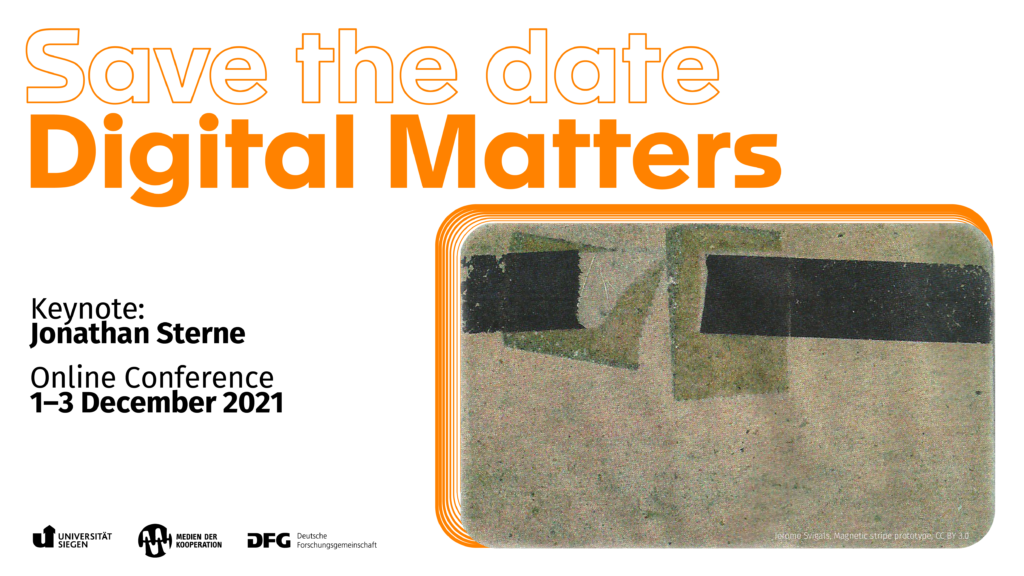 In popular discussion digitality is increasingly equated with networked immateriality: disembodied algorithms float rhetorically in an ethereal cloud of big data. Think, for example, of the “digital edition” of the PlayStation 5 console, so called because it has no optical drive to read games, which must instead be downloaded. The implication is that the regular PS5 console is somehow not digital because its storage medium is visible to the unaided human eye. This presupposition of digital immateriality is not just a misconception to be corrected, but a productive site for interdisciplinary scholarly inquiry into media and data practices. In Digital Matters, historians, media theorists and information scholars come together for three days to examine the socio-material constituents of digital systems and artifacts. How and why did people come to deny the materiality of the digital? What can we learn by recovering it? What if we rethink digital materialities as ongoing cooperative accomplishments?
In popular discussion digitality is increasingly equated with networked immateriality: disembodied algorithms float rhetorically in an ethereal cloud of big data. Think, for example, of the “digital edition” of the PlayStation 5 console, so called because it has no optical drive to read games, which must instead be downloaded. The implication is that the regular PS5 console is somehow not digital because its storage medium is visible to the unaided human eye. This presupposition of digital immateriality is not just a misconception to be corrected, but a productive site for interdisciplinary scholarly inquiry into media and data practices. In Digital Matters, historians, media theorists and information scholars come together for three days to examine the socio-material constituents of digital systems and artifacts. How and why did people come to deny the materiality of the digital? What can we learn by recovering it? What if we rethink digital materialities as ongoing cooperative accomplishments?
The Digital Matters conference is going to take place December 1 – 3, 2021 at Siegen University’s Collaborative Research Center Media of Cooperation. Given the swift change in pandemic circumstances it will primarily be an online event.
Please check https://www.socialstudiesof.info/digitalmatters for the most up to date information on the program, and how to participate.
The conference is organized by Thomas Haigh (University of Wisconsin–Milwaukee & Siegen University), Valérie Schafer (University of Luxembourg), Axel Volmar (Siegen University) & Sebastian Giessmann (Siegen University).
December 1:
13:45: Conference introduction and welcome
Moderator: Valérie Schafer (C2DH, University of Luxembourg)
14:00-14:50: “Travelling machines,” Camille Paloque-Bergès (CNAM, Paris).
15:00-15:50: “Dimensions of Materiality,” Kyle Stine (Johns Hopkins University).
15:50-16:30: Break for virtual coffee.
Moderator: Miglè Bareikytè (Siegen University)
16:30-17:20: “Dance Notation: Grammars for Understanding and Controlling the Body,” Quinn DuPont (University College, Dublin).
17:30-18:20: “Modularity, Materiality, and the Political Order of the Stacks,” Jean-François Blanchette (University of California at Los Angeles).
December 2:
Moderator: Susanne Förster (Siegen University)
13:30-14:20. “Looking for Oil (and Finding It) in the History of Computing,” Cyrus Mody (Maastricht University).
14:30-15:20. “Digitality and Nature in the Anthropocene,” Felix Stalder (Zurich University of the Arts).
15:20-16:00: Break for virtual coffee.
Moderator: Sebastian Giessmann (Siegen University)
16:00-16:50: “The Great eBook Conspiracy: eReaders, Publishers, and Price Competition in the Early 2000s,” Gerardo Con Diaz (University of California at Davis).
17:00-17:50: “Rematerializing Money: Payment as Palimpsest,” Lana Swartz (University of Virginia) 17:50-18:30.
Break for virtual coffee or, for the adventurous, virtual cocktails.
18:30: Keynote lecture, “Some Species of Materiality.” Jonathan Sterne (McGill University). Moderated by Axel Volmar (Siegen University).
December 3:
Moderator: Thomas Haigh (University of Wisconsin–Milwaukee & Siegen University)
13:00-13:50. “The Politics of Technical Systems,” Bernhard Rieder (University of Amsterdam).
14:00-14:50. “Digital Materiality and Historical Innovation,” Ulf Hashagen (Deutsches Museum).
14:50-15:15. Break for virtual coffee.
Moderator: Tatjana Seitz (Siegen University)
15:15-16:15. “Web Materialities,” Valérie Schafer (C2DH, University of Luxembourg).
16:20-17:00. Closing roundtable featuring the organizers pondering lessons learned.
Netzwerke im Kulturtransfer
Kulturkontakte und Kulturtransfer finden stets in Netzwerken statt: Sie sind von Beziehungen zwischen einzelnen Vermittler:innenfiguren und vermittelnden Institutionen, von materiellen und konventionellen Handels-, Verkehrs- und Kommunikationswegen, von den transportierten Gegenständen und nomadischen Medien, und von den impliziten Protokollen für jede der einzelnen involvierten Kommunikationen und Kooperationen abhängig. Der in den letzten beiden Jahrzehnten rasante und innovative Fortschritt der Forschung zu Netzwerken in etlichen Disziplinen bietet den Geisteswissenschaften deshalb auch in diesem Bereich neue Herausforderungen und Chancen.
Die zweitägige interdisziplinäre Tagung Netzwerke im Kulturtransfer untersucht Prozesse der kulturellen Vermittlung dezidiert mit dem Blick auf jene Netzwerke, die sie ermöglichen und die von ihnen performiert werden. Es gilt, neue Verfahren und Begriffe zu entwickeln, die dem Fortschritt der Netzwerkforschung Rechnung tragen und zugleich grundlegend zum Verständnis gerade grenzüberschreitender kultureller Netzwerke beitragen – von der qualitativen und quantitativen Netzwerkforschung über Akteur-Netzwerk-Theorie und Akteur-Medien-Theorie bis zu Profilierungen zwischen system- und netzwerkorientierten Ansätzen.
Memory, Mind and Media
There is a new open access journal in the making, and I am glad to be part of its editorial board. Please check out the homepage of Memory, Mind and Media at Cambridge University Press. While its official launch date is 2022, first online articles will be published by mid-2021. The journal is edited by Andrew Hoskins (University of Glasgow, UK) and Amanda J. Barnier (Macquarie University, Australia).
Memory, Mind & Media (MMM) explores the impact of media and technology on individual, social and cultural remembering and forgetting. This agenda-setting journal fosters high-quality, interdisciplinary conversations combining cognitive, social and cultural approaches to the study of memory and forgetting in the digital era. The pervasiveness, complexity and immediacy of digital media, communication networks and archives are transforming what memory is and what memory does, changing the relationship between memory in the head and memory in the wild.
MMM offers a new home for a wide variety of scholars working on these questions, within and across disciplines, from history, philosophy, media studies, cultural studies, law, literature, anthropology, political science, sociology, neuroscience, psychology, cognitive and computational science and elsewhere.
The journal gives priority to submissions that are cross-disciplinary and/or interdisciplinary, experimental, agenda-setting and push the boundaries of existing knowledge and methods. The journal insists on jargon-free, plain English submissions to ensure a widely accessible forum for cutting edge work.
MMM is a high-quality, peer-reviewed journal, publishing online and Open Access. As a barrier-free Gold OA journal, a fee waiver system is in place for unfunded authors. You can submit your article using our online submission system here. General queries should go to memorycambridge@gmail.com.
